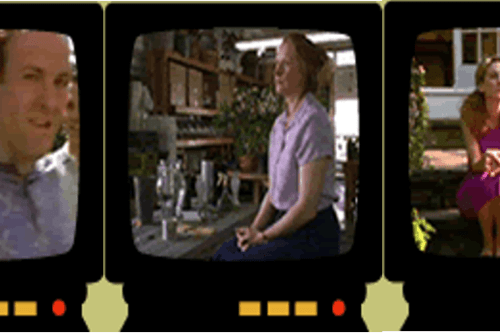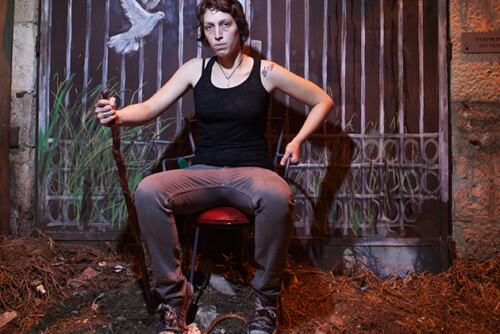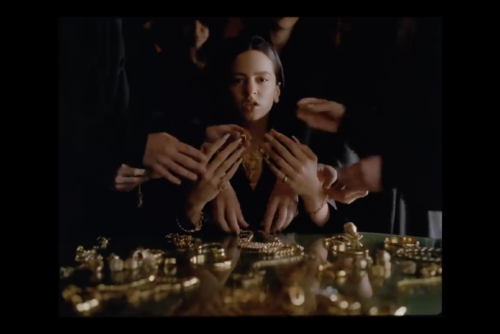In a gesture of solidarity with sex workers, the episode encourages the audience to sympathize with Tracee, as we see her humiliated and hurt in a thousand small ways before the scene of her death. She tries to show Tony her braces and is reprimanded by Silvio for fraternizing. She offers a kiss to Ralphie and he turns away, making rude remarks about what she’s been doing with her mouth. She says “hi” to Tony with a huge smile, but he waves her away and goes into another room with another stripper. Standing there in her too-tight tomato-red dress, hair swept up in an approximation of classiness and elegance, she has that look of gangly girls in six-inch heels for the first time. With this shot, the stripper is transformed into wallflower. The usual catty attitude among women toward exotic dancers (based on distorted fantasies of the stripper as blonde bombshell, a jealousy that implicitly condones violence against sex workers who are regarded as getting what they deserve) is undermined as the camera lingers on Tracee’s disappointed face and awkward retreat. She becomes someone we recognize, someone we can identify with, someone we have perhaps been.
She becomes a fool.
Dale Bauer uses such an image in “Gender in Bakhtin’s Carnival” to explicate the behavior of certain characters in novels by Hawthorne, James, Wharton, and Chopin, and this appropriation of Bakhtin can be extended to my own analysis of Tracee in The Sopranos. The function of the fool is that she does not understand social conventions, and in the absence of her understanding, she prompts “a dialogue about those very interpretive norms.” In this way, the fool acts “as a resisting reader within the text” and “provid[es] the means of unmasking dominant codes.” “Stupidity,” writes Bauer, “forces the unspoken repressions into the open, thus making them vulnerable to interpretation, contradiction, and dialogue” (715). “The role of the reader” when confronted with the fool “is to question and restructure the ‘cultural and intertextual frames’ in which the character operates and is made foolish” (715). In several scenes, Tracee forces other characters to explain the social conventions that structure their relationships. Tony turns down the date-nut bread because he already has a family, spelling out the difference between that gift-giving dynamic and the more limited employer-employee relationship he expects her to maintain with him. He is pushed to articulate a cultural belief he does not necessarily understand himself. “Bread,” he muses as she walks away. This frame of family-versus-work or private-versus-public that separates Meadow and Tracee into different kinds of girls appears to Tony as foolish in the face of Tracee’s death. Tracee doesn’t understand that she is not wife material, or even mistress material, and she forces the conventions into the open for discussion by acting as if there are no such boundaries. In being rebuffed, dismissed, and finally killed, she dramatizes the impact of these conventions on particular female bodies.
In this foolishness-as-resistance, she grasps a degree of female narrative authority for herself, “controlling the distribution of hidden knowledge” (Akass and McCabe 151) by wielding the open secret of Ralph’s troubled masculinity. She resists Ralphie’s emotional withholding, responding not with tears but with emasculating comments.
Ralphie: “That’s how you treat a man?”
Tracee: “What man?”
Her words remind us and Ralphie that, as bell hooks has argued, not all men are rewarded equally under patriarchy. 1
Much of this episode focuses on Ralphie’s performances of masculinity, linking them with his failed efforts to achieve a higher level of status among the other men. At this point in the season he has asked to be promoted to captain and has been denied. He goes around quoting Russell Crowe’s lines in Gladiator, from the bravado (“I have come to reclaim Rome for my country”) to the despair (“We are all dead men; all we can do is choose how we die”). His ability to “earn” for the guys above him in the mafia hierarchy, which he mentions frequently, positions him as a figure of the contemporary American blue-collar worker. Without denying the inequality between Ralph and Tracee, we can still note their similarly disenfranchised positions (the lack of class access to institutions of higher education and upwardly mobile socialization). In the same way that Tracee’s class status makes stripping not the least lucrative or liberating job choice, Ralphie too faced a limited range of career options, with his 11th-grade-level education. Becoming a member of the mafia in this sense is not unlike joining the military; rather than an exercise of power it is a reflection of economic necessity and an initiation into a violent, Darwinian, hypermasculine system in which many men are made to feel quite vulnerable and feminized. Ralph turns on Tracee and brutalizes her because she undermines his masculinity in front of his peers; his vulnerable class status makes it feel imperative to him to protect his masculinity. His violence against her is a manifestation of this class anxiety, at least as much as it is an exercise of patriarchal power. And for those who perceive capitalism as a system of prostitution, the struggle between Ralph and Tracee is not merely between man and woman but between different kinds of sex workers, as Ralphie peddles his aggressive masculinity to improve his social position. (Having received a “Pasta-tute award” for selling out his Italian heritage, David Chase might also be included in this loose cluster of sex workers [Lloyd].)
This idea that we are all whores under capitalism takes me back to the topic of noteworthy segues. Early in the episode, Silvio slaps Tracee and slams her down on the hood of his car after she misses three days of work. Ralphie watches from the window of his house where they had been dining together on Fresca and Pop Tarts; his laughter melds seamlessly into laughter at the family dinner table with his official girlfriend, Rosalie Aprile, and their guests. The dinner party conversation is structured by the much-ballyhooed “war between the sexes,” as the couples trade cliché complaints about empty milk cartons in the fridge and “the football trance” (men cannot seem to hear their wives when sports are on TV). They have, as Rosalie says, “the attention span of children.” This lame rehearsal of the popular men-are-from-Mars discourse signals a lethargic antagonism beneath the surface of everyday domesticity. Ralphie’s laughter (vindictive and face-saving in the scene with Tracee, giving the lie to the warmth and hospitality in the scene with Rosalie) marks the facade of “family values” often used to demonize strip clubs and the women who work there. John D’Emilio’s essay, “Capitalism and Gay Identity,” offers a useful context for this diversion: While capitalism itself is structurally responsible for the dispersal of the nuclear family, feminism and the sexual revolution are routinely blamed for it. 2 Tracee’s disposability is dramatized as a sacrifice to the social-ladder-climbing of the middle-class family (a back alley abortion of sorts). Thus the stripper as resisting reader goes hand in hand with the stripper as scapegoat. Through strategic editing, the episode “University” repeatedly collapses the violence of strip club spaces against the performed bonding of home life, underscoring the continuities between stigmatized and socially sanctioned arenas to assert that they are not as separate or opposite as our symbolic register suggests. 3
- hooks makes this point in her analysis of the Central Park Jogger rape: “. . . by combining a feminist analysis of race and masculinity, one sees that since male power within patriarchy is relative, men from poorer groups and men of color are not able to reap the material and social rewards for their participation in patriarchy. In fact they often suffer from blindly and passively acting out a myth of masculinity that is life-threatening. Sexist thinking blinds them to this reality. They become victims of the patriarchy” (quoted in Bordo 286). Susan Bordo praises this analysis as exemplary postmodern feminist cultural criticism.[↑]
- “Ideologically, capitalism drives people into heterosexual families: each generation comes of age having internalized a heterosexist model of intimacy and personal relationships. Materially, capitalism weakens the bonds that once kept families together so that their members experience a growing instability in the place they have come to expect happiness and emotional security. Thus, while capitalism has knocked the material foundation away from family life, lesbians, gay men, and heterosexual feminists have become the scapegoats for the social instability of the system” (D’Emilio 473).[↑]
- Donatelli and Alward write that David Chase’s “genius is to make violence as domestic as going for a tennis lesson or taking Meadow for a tour of colleges. . . . [V]iolence is . . . almost always bracketed with homely domestic scenes” (64). Creeber likewise examines this “cross-cutting . . . ‘between scenes of extreme violence and domestic warmth'” (130). [↑]



